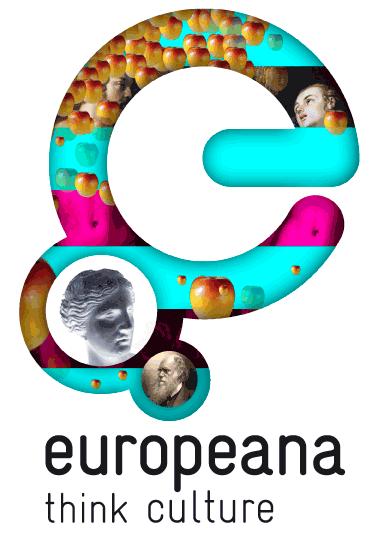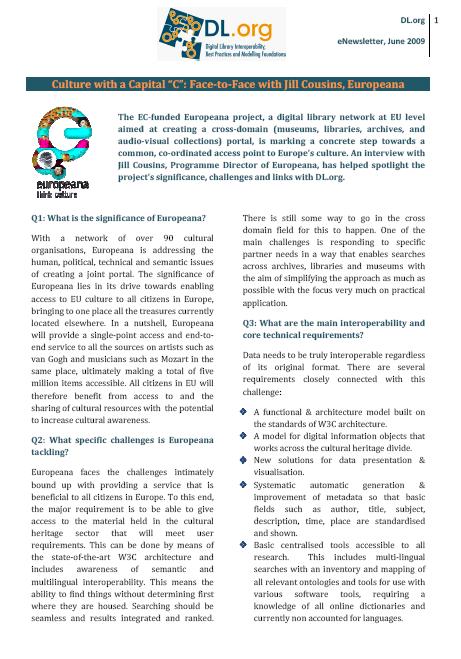Interview with Jill Cousins, Europeana

The EC-funded Europeana project, a digital library network at EU level aimed at creating a cross-domain (museums, libraries, archives, and audio-visual collections) portal, is marking a concrete step towards a common, co-ordinated access point to Europe’s culture.
"DL architectures fundamentally rely on interoperability which in turn has its foundations in standards, especially in settings such as Europeana which are built on multilateral interoperability of many independent partners and platforms. One of the first steps the Commission took for preparing Europeana was to create a working group on 'Interoperability of Digital Libraries'. The DELOS Reference Model was very useful for this group and I strongly believe that the same will be true for the work of DL.org for the DL community as a whole.” Stefan Gradmann, Humboldt University, Europeana & member of DL.org Content Working Group.
An interview with Jill Cousins, Programme Director of Europeana, has helped spotlight the project’s significance, challenges and links with DL.org.
What is the significance of Europeana?
With a network of over 90 cultural organisations, Europeana is addressing the human, political, technical and semantic issues of creating a joint portal. The significance of Europeana lies in its drive towards enabling access to EU culture to all citizens in Europe, bringing to one place all the treasures currently located elsewhere. In a nutshell, Europeana will provide a single-point access and end-to-end service to all the sources on artists such as van Gogh and musicians such as Mozart in the same place, ultimately making a total of ten million items accessible. All citizens in EU will therefore benefit from access to and the sharing of cultural resources with the potential to increase cultural awareness.
What specific challenges is Europeana tackling?
Europeana faces the challenges intimately bound up with providing a service that is beneficial to all citizens in Europe. To this end, the major requirement is to be able to give access to the material held in the cultural heritage sector that will meet user requirements. This can be done by means of the state-of-the-art W3C architecture and includes awareness of semantic and multilingual interoperability. This means the ability to find things without determining first where they are housed. Searching should be seamless and results integrated and ranked. There is still some way to go in the cross domain field for this to happen. One of the main challenges is responding to specific partner needs in a way that enables searches across archives, libraries and museums with the aim of simplifying the approach as much as possible with the focus very much on practical application.
What are the main interoperability and core technical requirements?
Data needs to be truly interoperable regardless of its original format. There are several requirements closely connected with this challenge:
- A functional & architecture model built on the standards of W3C architecture.
- A model for digital information objects that works across the cultural heritage divide.
- New solutions for data presentation & visualisation.
- Systematic automatic generation & improvement of metadata so that basic fields such as author, title, subject, description, time, place are standardised and shown.
- Basic centralised tools accessible to all research. This includes multi-lingual searches with an inventory and mapping of all relevant ontologies and tools for use with various software tools, requiring a knowledge of all online dictionaries and currently non accounted for languages.
What is the main expected impact in terms of Europeana outputs?
Key Europeana outputs include the maquette showing what has been requested by users and Initial Semantic & Technical Interoperability Requirements. Further outputs from the project will be very important in informing the state of the art and recommendations for research in digital libraries.
How are DL.org and Europeana working together to pave the way for interoperability?
DL.org is instrumental in moving research forward through the focused activities on issues and challenges surrounding interoperability underpinned by the experts forming part of the Working Groups. The participation of Europeana in these Groups is key to fostering high-level knowledge exchange on Digital Libraries and interoperability. DL.org workshops and DL events provide an additional forum for consolidating this knowledge exchange on topics of mutual interest and benefit.
Stephanie Parker, Trust-IT Services Ltd
Jill Cousins Profile
 Jill Cousins is Director of the European Library (Netherlands), Programme Director of Europeana and Executive Director of the EDL Foundation. Jill has many years experience in web publishing. Her past includes moving from the extremely commercial publishing world where she was European Business Development Director of VNU New Media to scholarly publishing.
Jill Cousins is Director of the European Library (Netherlands), Programme Director of Europeana and Executive Director of the EDL Foundation. Jill has many years experience in web publishing. Her past includes moving from the extremely commercial publishing world where she was European Business Development Director of VNU New Media to scholarly publishing.


